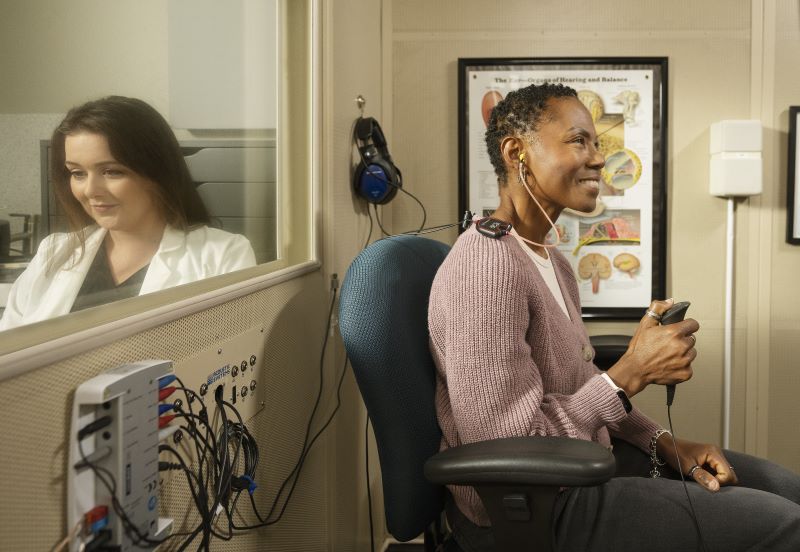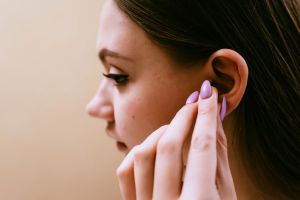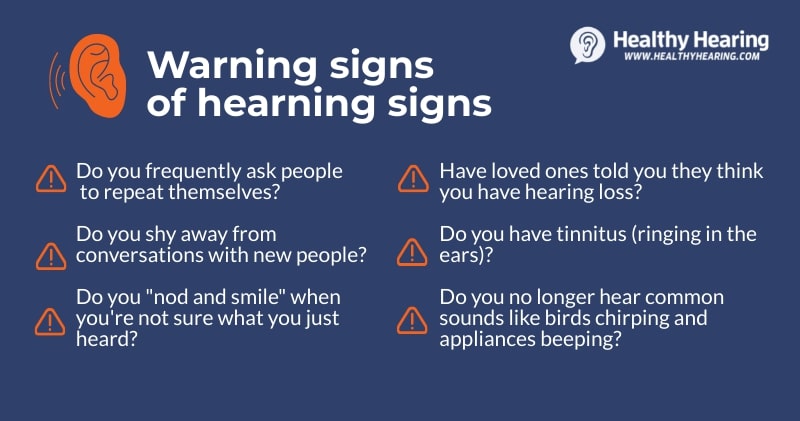|
www.HealthyHearing.com |
Hearing loss
By Joy Victory, managing editor, Healthy Hearing  Reviewed by
Megan Gerhart, audiologist Reviewed by
Megan Gerhart, audiologist Last updated on: April 2nd, 2025 Hearing loss is generally incurable but often treatable. Learn about hearing loss symptoms, causes, treatment and prevention. Key points:
A common conditionThe National Institute on Deafness and Other Communication Disorders (NIDCD) estimates that 15% of adults in the United States have hearing loss, making it twice as common as diabetes or cancer. Your risk increases with age: Half of all people 75 and older have hearing loss. Hearing loss is usually incurable but treatable. By learning more about the symptoms, types, causes, tests, treatments and prevention of hearing loss, it is easier to understand how it impacts you and your loved ones—and what you can do about it. SymptomsThe symptoms of hearing loss can vary depending on the type, cause and severity of hearing loss. Most cases start gradually and progressively worsen if not treated. High-frequency hearing loss is most common and affects your ability to hear high pitched sounds, such as women's voices and birds chirping.
In general, people who have hearing loss may experience any or all of the following:
Types
understand conversations in noisy places. There are three main types of hearing loss:
CausesThere are many causes of hearing loss, and it's important to figure out what is causing the hearing loss to determine the right treatment. The two most common causes are age-related hearing loss and frequent exposure to loud noise. This is the reason why we recommend people 60 years and older as well as those who work in louder environments to get their hearing checked every few years, regardless of if they are experiencing symptoms. Other causes include:
Less commonly:
Hearing tests: What to expect from an evaluationIf you suspect you have a hearing loss, schedule a hearing test with a qualified hearing healthcare professional. Hearing tests are simple, painless, and widely available. Your provider will begin by conducting a thorough history, and they will ask questions about the challenges you are having, as well as your lifestyle and your communication needs. 
Most hearing tests involve a sound-treated room or booth and headphones. Your hearing care professional will look at your ear canals and eardrum using a lighted tool called an otoscope to help determine if a physical blockage, such as earwax is contributing to your hearing issues. In the booth, you'll listen to different tones and press a button when you hear the softest ones. This test, called pure tone audiometry, helps measure your hearing loss and which frequencies are affected. You may also be asked to listen to and repeat words. This part of the test checks the softest speech sounds you can hear and how well you understand speech when it's loud enough. Sometimes, speech tests are done with background noise to see how well you hear and understand in noisy environments. Want to learn more? Visit our hearing test help page or take our online hearing test Hearing aids and other treatment optionsHearing loss is generally not curable, but it is almost always treatable. Typically, it will be treated with one of three options: Hearing aidsHearing aids are small devices worn in or behind the ear that amplify sounds to help people with hearing loss hear more clearly. They are the most common treatment for permanent hearing loss. They are available by prescription from an audiologist or hearing specialist. Adults with mild to moderate hearing loss can also purchase over-the-counter hearing aids. However, there are pros and cons to these devices. Cochlear implantsCochlear implants are surgically implanted devices that bypass damaged parts of the ear and directly stimulate the auditory nerve, providing a sense of sound. They are best for people with more severe to profound hearing loss. Bone-anchored hearing systemsBone-anchored hearing systems are devices that use bone conduction to send sound vibrations directly to the inner ear, bypassing the outer and middle ear. They work best for people with unilateral hearing loss or single-sided deafness. They also are beneficial for those with malformations of the outer or middle ear or who otherwise can't wear hearing aids due to irritation that they cause. Finding the right treatmentYou and your hearing care professional will work together to find the right treatment option to best meet your needs. Things that need to be taken into consideration include the type, severity and cause of your hearing loss as well as:
Can you reverse hearing loss?In most cases, hearing loss is permanent. However, cases of conductive hearing loss can be reversed if the obstruction can be removed either medically or surgically. Additionally, prompt treatment of sudden hearing loss with steroids can reverse hearing loss, but it's essential to seek help right away to increase the odds of saving your hearing. Can you prevent hearing loss?
noisy situations. While you can't completely eliminate your risk, there are ways to prevent hearing loss or stop it from getting worse. The most important thing you can do is reduce your exposure to loud or excessive noise. According to the Centers for Disease Control and Prevention (CDC), "an estimated 12.5% of children and adolescents aged 6-9 years and 17% of adults aged 20-69 years have suffered permanent damage to their hearing from excessive exposure to noise." Along with reducing your exposure, you should make sure to wear hearing protection in situations that you will be loud.
Hearing protection generally comes in the form of earplugs or earmuffs. Earplugs are made of acoustically impenetrable materials. When sized correctly and inserted into the ear, they can provide a good deal of hearing protection. Earmuffs offer greater protection against prolonged or higher levels of noise. These devices work by covering the entire ear to block loud noises. Noise-induced hearing loss can also occur when the volume is too high or the duration too long when using headphones or earbuds. To protect your hearing, use apps on your smartphone to ensure your volume stays at safe levels. Additionally, take regular breaks—especially if you've been listening for more than an hour—to give your ears some rest. The hidden dangers of untreated hearing lossHearing loss can affect more than just your ability to hear—it can influence your health well-being and quality of life. Studies show that untreated hearing loss is linked to higher rates of depression, anxiety, and social isolation. It may also increase your risk of falls, which can be especially dangerous for older adults. Additionally, it can lead to auditory deprivation, where the brain is under-stimulated, potentially impacting cognitive function. I think my child has trouble hearingHearing loss is harmful to people of all ages, but for children, it has special implications. Because babies and young children need to hear in order to develop spoken language, good hearing is the foundation for spoken communication, social development and educational success. If you suspect your child has hearing problems, it’s important to seek help from a pediatric audiologist. Early testing and intervention, ideally before 6 months of age, can greatly improve outcomes. Read more: Hearing loss in children Take action for your hearing healthIf you or a loved one is experiencing hearing difficulties, it's important to seek professional help. Find a hearing clinic near you. They can provide a hearing evaluation and recommend solutions to improve your hearing and quality of life. Don’t wait—addressing hearing loss early can have a lasting positive impact on your health and well-being. Joy Victory, managing editor, Healthy Hearing
You are reading about: Related topics
More information about hearing aids, hearing aid brands, assistive devices and tinnitus. Featured clinics near me
Hearing Health Solutions from Ohio ENT - Columbus
Earzlink Hearing Care - Reynoldsburg Find a clinicWe have more hearing clinic reviews than any other site! Related contentThe Healthy Hearing Report |
|
www.HealthyHearing.com |
Hearing loss
By Joy Victory, managing editor, Healthy Hearing  Reviewed by
Megan Gerhart, audiologist Reviewed by
Megan Gerhart, audiologist Last updated on: April 2nd, 2025 Hearing loss is generally incurable but often treatable. Learn about hearing loss symptoms, causes, treatment and prevention. |




 Joy Victory has extensive experience editing consumer health information. Her training in particular has focused on how to best communicate evidence-based medical guidelines and clinical trial results to the public. She strives to make health content accurate, accessible and engaging to the public.
Joy Victory has extensive experience editing consumer health information. Her training in particular has focused on how to best communicate evidence-based medical guidelines and clinical trial results to the public. She strives to make health content accurate, accessible and engaging to the public.